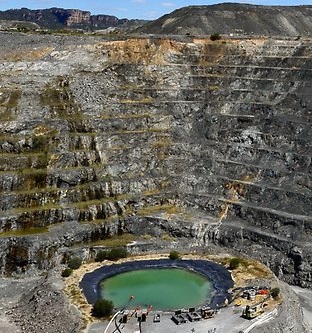Rio tries to move away from uranium clean-up and deadly allegations
 Mining giant Rio Tinto is moving to distance itself from having to rehabilitate the site of the Ranger uranium mine, and is facing international allegations over the deaths of dozens of workers.
Mining giant Rio Tinto is moving to distance itself from having to rehabilitate the site of the Ranger uranium mine, and is facing international allegations over the deaths of dozens of workers.
Rio Tinto’s nuclear subsidiary Energy Resources of Australia (ERA) has done all the open-cut work at Ranger that it can, and now says it wants to move underground to continue the hunt for uranium.
But before it can dig any deeper, ERA is obliged to clean and restore the aboveground site, which sits within the boundaries of Kakadu National Park about 200 kilometres east of Darwin.
However, the chief executive of ERA’s owner; Rio Tinto’s Sam Walsh, has told the company's shareholders in London that rehabilitation of the mine site is ERA's responsibility alone.
“This is a public Australian company and clearly that is an issue for them,” he said.
A question from the floor: “But not for you?”
“We are clearly shareholders, but it is a matter for all shareholders and a matter for the ERA board,” Mr Walsh replied.
“There was a rights issue, and the rights issue developed the funds to cover the rehabilitation.”
Minutes of the meeting are available in PDF form, here.
Meanwhile, global trade union IndustriAll has accused Rio of “very wide breaches of fundamental rights”.
The group representing 50 million industrial workers worldwide says the Anglo-Australian mining firm failed to prevent the deaths of 41 people last year.
IndustriAll says more could have been done to reduce the death toll from alleged lapses in safety.
Kemal Özkan, assistant general secretary of IndustriAll, said the deaths of 33 gold miners in a tunnel collapse last year could have been avoided. The tragic incident happened at a Rio joint venture mine in Indonesia
He says Indonesian human rights commissioners found that the dual operators of the Grasberg mine, US company Freeport and Rio Tinto, “had the ability to prevent this from happening but didn't”.
“The lack of effort jeopardised the lives of others. The gravity of this case is serious,” Özkan quoted Indonesian human rights commissioner Natalius Pigai as having said in his report.
Jan du Plessis, Rio's chairman, has called the Indonesian deaths a “tragedy”, but said Rio was taking measures to improve safety.
“We've got to be [by far] one of the leaders in this field [safety],” he said at the company's annual meeting in London.
A company spokesman later said: “Rio Tinto does not manage the Grasberg operation, but we do not stand aside when fatalities occur. We are working with Freeport, the managers of the mine on safety, as well as community, human rights and other issues.”
Outspoken private Rio shareholder John Farmer says it is unacceptable that the company is trying to “gloss over 33 deaths just because it [the mine] is managed by someone else”.
Locals have risen in protest against the Grasberg mine, which has also been at the centre of alleged environmental abuses. Papuan community groups have been joined by others raising concerns over alleged human and environmental abuses in Madagascar, Australia, Namibia and the US.







 Print
Print